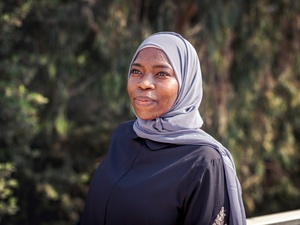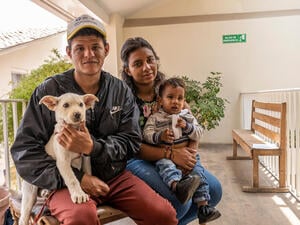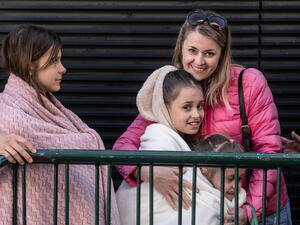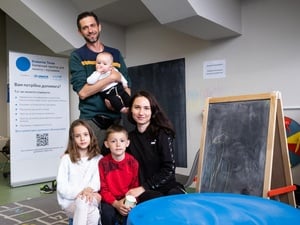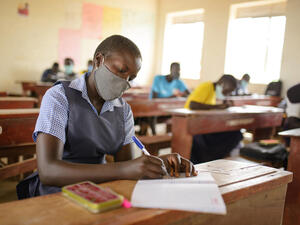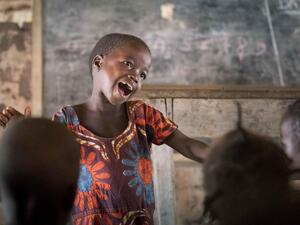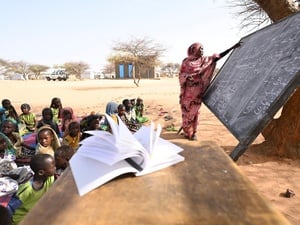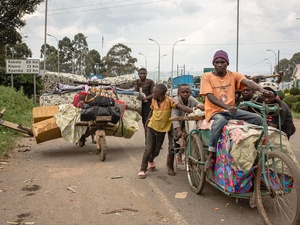Congolese children benefit from gift of UNHCR school
Congolese children benefit from gift of UNHCR school
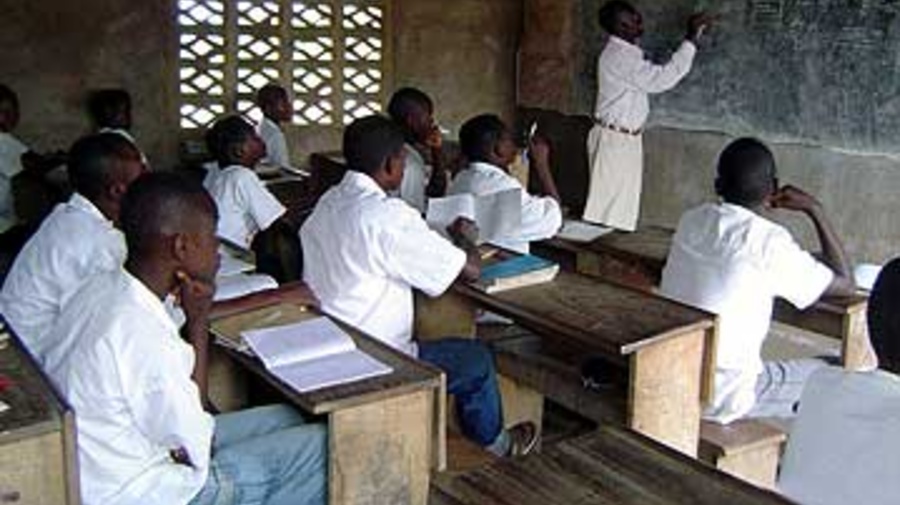
As part of UNHCR's phasing out of operations in the Bas Congo, a school built for Angolan refugees in Kilueka is handed over to the remaining refugee community.
KILUEKA REFUGEE CAMP, Democratic Republic of the Congo, Jan. 24 (UNHCR) - As president of the Parent-Teacher committee at the Ecole Primaire de Kwilu, Fidel Nsinga is enormously proud of the school his children attend. The two dozen neat red-brick classrooms built around a square, where 1,500 pupils receive an education, are a gift from the UN refugee agency.
"We are very happy with what UNHCR has done for us," says Nsinga, the 43-year-old farmer and father of seven. "The community is very happy because this is a good school. It is permanent," he says, gesturing to school's brick walls and corrugated iron roofs, a sharp contrast with Kilueka's other buildings, mostly made of mud walls and grass thatched roofs.
A father of seven himself, Nsinga appreciates the value of education. "There isn't another school like this in this area," he says pausing on his way to a meeting with the school's head teacher.
"We now have to work hard to ensure we can pay the teachers so our children can continue to have a good education. It will not be easy because as you know, our people are poor. It will not be easy."
After the return home of most of the Angolan refugees in the Democratic Republic of the Congo (DRC), UNHCR is preparing to withdraw from a five-year-old refugee assistance programme in Kilueka and Nkondo refugee camps in Bas Congo by the end of the year.
Since the signing of a peace agreement in Angola in 2002 and the launch of an organised voluntary repatriation operation in June 2003, almost 40,000 refugees have returned home from asylum in the DRC. Many of those who have opted to remain in the DRC have received UNHCR assistance to integrate into the local community and become self-sufficient. This year UNHCR will also rehabilitate the environment in and around the refugee camps.
In addition to the school, at the end of December last year, UNHCR officials handed over to health authorities a 50-bed health centre in Nkondo camp as well as a six-month supply of medicines and medical supplies for up to 9,000 people.
The facilities are expected to support the government's efforts to integrate the remaining group of refugees into the local community. The health centre will be run by the government and will continue to be used by both the local community and some 800 refugees left in Nkondo. UNHCR is also rehabilitating a health centre some two kilometres from Kilueka refugee camp.
Ndeye Mbaye, who manages the UNHCR assistance programmes for Angolan refugees in Kimpese, assured a gathering of refugees in Kilueka and Nkondo camps they have no reason for concern.
"Assistance to refugees will continue under the direct management of the Government," she said. "It's great to see that a humanitarian assistance project continues and benefits both refugees and the hosting community. Now we have practically achieved linking relief and development assistance."
And she reassured refugees that UNHCR will remain present in the area to oversee their integration and ensure their international protection.
"UNHCR's doors will remain open to you. We will support you as much as possible to help your integration into the local community," Mbaye told the refugees.
Nsinga's parent-teacher committee has already swung into action to make the most of the new school. "After the hand-over ceremony, I immediately called a meeting of the parents committee to set the school fees and agree on the salary for the teachers," he says.
"The meeting was very lively. Parents had many good ideas. They would like the teachers to live closer to the school so they can give more attention to our children. The teachers would like good desks, chairs, shelves and lockable doors so that we do not lose school supplies and other school property. The security of the school is very important and we have already hired two security guards."
The meeting agreed that each pupil would pay the equivalent of $6 in local currency per term. The money is to be used to buy school supplies - chalk, text books, exercise books - and pay the teachers' salaries of $24 a month, as well as cover pay for those two guards.
Nsimba Matondo, one of the refugees in Kilueka who has opted to stay in DRC, her home for the last six years, is grateful for all the support the refugees have received over the years from UNHCR.
"Since we came to Kilueka in 1999, we have not paid school fees," she said. "UNHCR was paying for us. If you were sick, you went to the health centre. We paid a small amount for consultation but the medicine was free. We could feed our children because UNHCR distributed food," said the middle-aged refugee who fled fighting in Serra da Kanda in northern Angola in 1999.
Breast-feeding her six-month-old boy, she faces the future stoically. "We now have a lot of responsibilities. Our children must eat and go to school. And we have to pay. We are worried because we have not done this since we came to Kilueka, but little by little, we will manage. We have to, don't we?"
By Millicent Mutuli in Kimpese, Democratic Republic of the Congo


